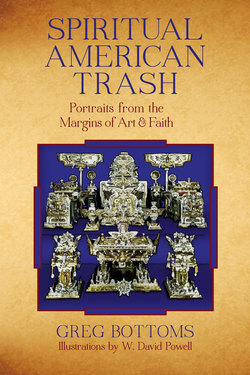Читать книгу Spiritual American Trash - Greg Bottoms - Страница 22
На сайте Литреса книга снята с продажи.
5.
ОглавлениеThere is no evidence that I can find that he saw heavy action in World War II, when he served on a navy ship in the Pacific. But you might have thought he had if you ran across him in the 1960s, when he was back in Key West with his mother. If you had known him when he was a boy, that little confident kid with the shiny hair and the smile and the drum, you might wonder what happened. Makiki, huh? Dude seemed a little off.
He rode around Key West on a tricycle with big, fat beach tires, along the same route usually, and he worked moonlighting as a musician and selling tickets at Cuban numbers games—an illegal but tolerated form of gambling. He lived in the same ramshackle cottage where he grew up with his aging mother, who people called that old “Voodoo Queen.”
You might have seen him in his matching tropical-print shirts and pants, his homemade knit fisherman hats, a new one almost every day.
“Guy with the macramé hats?”
“Mr. Take My Time on the Tricycle?”
“Señor Tropical Threads?”
By the ’70s, tourists had found Key West—found it big-time—and it was a different place. Young people and college students were walking up and down every street during the summer. Drugs were a regular part of American youth culture by then, and an even bigger part of the scene in Key West. Forget about all that idealism and mind expansion of the ’60s. Narcotics now were inseparable from our consumerism, our narcissism; they were quick routes to hedonism and escapism, a new and acceptable subculture based on wrecking your mind. Alfonso—Makiki—was just another trip in that context, as funny as he was sad to the tourists, a bit of local color, all dressed up on a tricycle with a blown-out mind.
